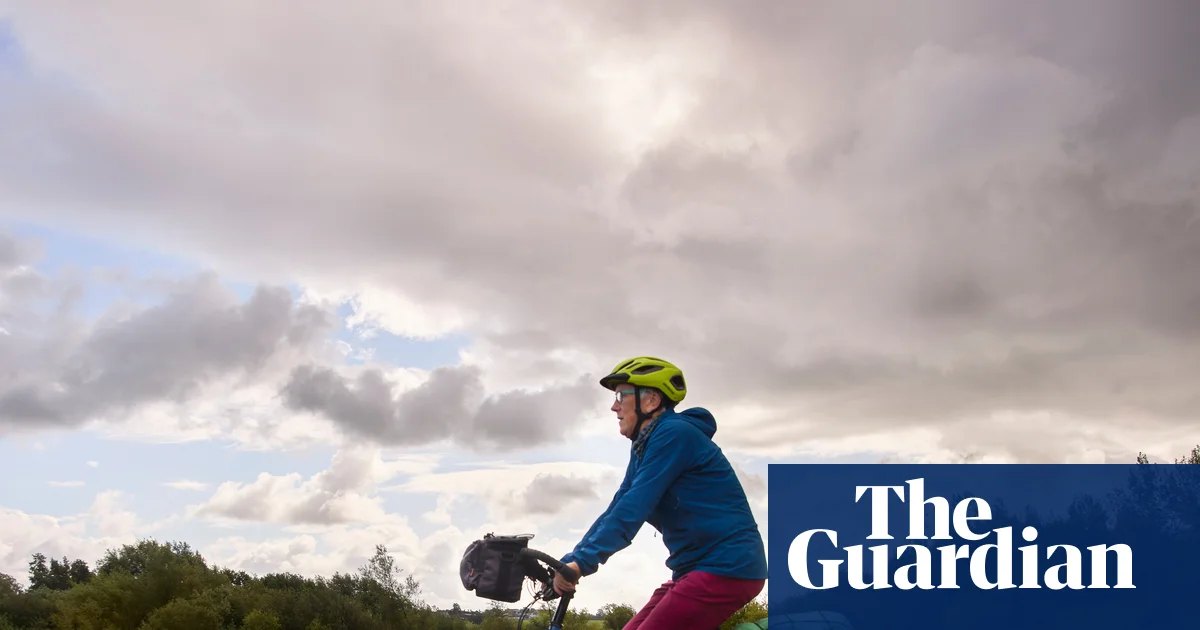When the urge became impossible to ignore, Sarah Cook bought a touring bike and an “all-singing, all-dancing four-season tent”, and packed her belongings into 68-litre bike bags.
She was 60, and, having rented out her flat in Cumbria, England, set off alone to pedal the Pacific west coast of the US. As she cycled away from Vancouver airport, “I was like ‘See you in six months!’,” Cook says. “Not having the weight of bricks and mortar and possessions was so liberating.” By the time she arrived in La Paz, Bolivia, 111 days later, she knew, “this is how I want to live my life.” Now 67, she has been itinerant ever since, and has cycled 24,000 miles.
Cook wanted to find out, she says, what happened “when your life was on the road. I thought something must switch in your head or your emotions … It is the ultimate living in the moment.” Each day, as she starts to turn the pedals, she says, “I feel weightless – as if I’m flying.”
Cook’s highlights include cycling nearly 3,000 miles across Europe, from the Black Sea to the Atlantic Ocean; camping beneath giant sequoia trees in California; wild camping in the Colombian páramo; and pedalling 2,000 miles of Patagonian coastline into Ushuaia in Argentina, to fulfil a childhood dream.
Growing up in a Surrey village, Cook traced explorers’ routes on to greaseproof paper from her parents’ world atlas. The eldest of six, she would lead her siblings down the garden with ingredients for tea, lift a piece of turf with her penknife, and make a campfire.
She studied medical sciences at university and worked for a while in a hospital hematology laboratory, but stopped to home school her three daughters and son.
But as she entered her 40s, “the negative committee” in her head asked her: “What have you done with your life apart from raise children?’ I was a bright girl with a degree.” When her children went to university, “I was like ‘What do I do now? Who recognises home-educating kids as personal development?’’
She trained for a mountain leader qualification, and another to teach English as a foreign language, then worked part-time – leading walking holidays, expeditions with teenagers and teaching English. She needed to be financially independent, having separated from her husband.
Although Cook returns regularly to England to see family, she has no fixed base, and switches between rentals or campsites. Between tenants, she has camped in her sleeping bag on the carpet of her flat. “It’s not my home now,” she says. “Although home is where I am.”
She feels settled even if she is only staying one night. “Everything that goes in my tent has an order to how I unpack it, and a place that I put it. And I’m amazed every time. How does this piece of fabric feel like home when I do that?”
Cycling, and living itinerantly, has given Cook “the knowledge that I can survive pretty much whatever happens”. She has two mantras. “One: ‘It’ll work out.’ The other: ‘Just do the next thing.’ When everything seems horrendous and you don’t think you can cope, just do the next thing. It might be sitting down to eat a banana.”
Cook has osteoarthritis in one hip, and cycling has its challenges. She had to push her bike uphill for five hours in Colombia. “My body is ageing and needs more rest and recuperation,” she says.
But she has no plans to stop. In the UK, where she is visiting family, she has toured the south of England and pedalled from the Shetlands to the southernmost tip of Cornwall.
It was grey and drizzly in Scotland, and everything was damp when she packed up and fastened the lights to her bike. The cloud was low, the gulls screeched. “And I have this vivid memory of thinking, ‘Why do I feel so ecstatically happy, setting off on my bike on this grey, drizzly morning?” Truth is, she says, “I get on the bike and start turning the pedals and it’s like my spirit takes off.”

